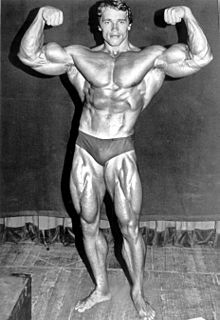
Back Liggaamsbou Afrikaans كمال أجسام Arabic كمال اجسام ARZ Culturismu AST Bodibildinq Azerbaijani Культурызм Byelorussian Культурызм BE-X-OLD Културизъм Bulgarian Bina awak BJN শরীর গঠন Bengali/Bangla
 Arnold Schwarzenegger, one of the most notable figures in bodybuilding, 1974 | |
| Highest governing body | International Federation of BodyBuilding & Fitness |
|---|---|
| Nicknames | BB |
| First developed | England, late 19th century |
| Characteristics | |
| Contact | No |
| Team members | No |
| Mixed-sex | No |
| Type | Indoor |
| Venue | Auditorium |
| Presence | |
| Country or region | Worldwide |
| Olympic | No |
| Paralympic | No |
| World Games | 1981–2009 |
Bodybuilding is the practice of progressive resistance exercise to build, control, and develop one's muscles via hypertrophy.[1] An individual who engages in this activity is referred to as a bodybuilder. It is primarily undertaken for aesthetic purposes over functional ones, distinguishing it from similar activities such as powerlifting and calisthenics.
In competitive bodybuilding, competitors appear onstage in line-ups and perform specified poses (and later individual posing routines) for a panel of judges who rank them based on conditioning, muscularity, posing, size, stage presentation, and symmetry.[2] Bodybuilders prepare for competitions by exercising and eliminating non-essential body fat. This is enhanced at the final stage by a combination of carbohydrate loading and dehydration to achieve maximum muscle definition and vascularity. Most bodybuilders also tan and shave their bodies prior to competition.[3]

Bodybuilding requires significant time and effort to reach the desired results. A novice bodybuilder may be able to gain 8–15 pounds (4–7 kg) of muscle per year if they lift weights for seven hours per week, but muscle gains begin to slow down after the first two years to about 5–15 pounds (2–7 kg) per year. After five years, gains can decrease to as little as 3–10 pounds (1–5 kg) per year.[4] Some bodybuilders use anabolic steroids and other performance-enhancing drugs to build muscles and recover from injuries faster. However, using performance-enhancing drugs can have serious health risks.[5] Furthermore, most competitions prohibit the use of these substances. Despite some calls for drug testing to be implemented, the National Physique Committee (considered the leading amateur bodybuilding federation) does not require testing.[6]
The winner of the annual IFBB Mr. Olympia contest is recognized as the world's top male professional bodybuilder. Since 1950, the NABBA Universe Championships have been considered the top amateur bodybuilding contests, with notable winners including Ronnie Coleman, Jay Cutler, Steve Reeves, and Arnold Schwarzenegger.
- ^ Emery M. "Men's Bodybuilding: A Short History". Bodybuildingreviews.net. Archived from the original on September 14, 2020. Retrieved February 25, 2014.
- ^ Admin. "Judging Criteria". World Natural Bodybuilding Federation. Retrieved October 15, 2023.
- ^ "Shaving Body Hair For Men!". Bodybuilding.com. August 30, 2010. Archived from the original on June 26, 2020. Retrieved January 12, 2021.
- ^ "How Long Does it Take to Be a Bodybuilder?". Livestrong.com. Archived from the original on April 23, 2021. Retrieved February 15, 2021.
- ^ "Anabolic Steroids and Other Appearance and Performance Enhancing Drugs (APEDs)". National Institute on Drug Abuse. Retrieved October 15, 2023.
- ^ "Should The IFBB Ban Steroids For Real?". Bodybuilding.com. March 16, 2005. Archived from the original on June 25, 2020. Retrieved January 12, 2021.